Did you know that 61 African tribes are represented across St Jude’s primary and secondary campuses?
Each year during September, the entire school celebrates the cultural unity of Tanzania and the beautiful, varied backgrounds from which our students and staff descend.
Julius Nyerere, the first President of Tanzania, set a bold example of strength in unity when he declared, “without unity, there is no future for Africa.”
The founding leader of this country, which many of our students will become leaders within, believed that regardless of tribe or religion, Tanzanians are primarily united by their national citizenship.
Having founded Tanzania on this premise, he left a legacy of cultural harmony on a continent that, so frequently, is stereotyped as a hotbed of hostility and conflict.
With Nyerere’s example underpinning the premise of cultural celebration, our 2018 Cultural Day was a colourful display of national pride and vision for the future.
Throughout the event, 13 groups of students performed entertaining arts showcases, ranging from Hindi songs to traditional ngoma dancing and fashion exhibitions.
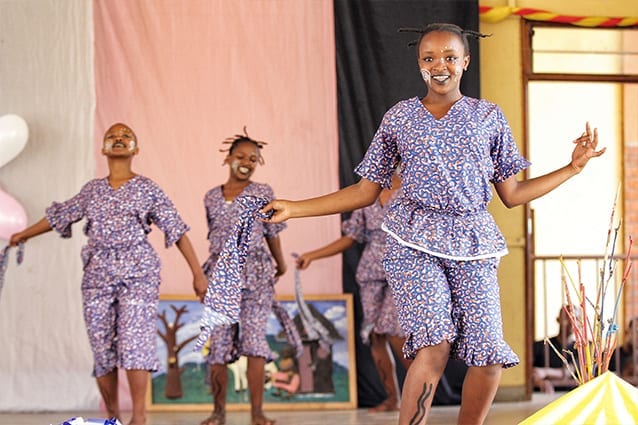
Mr Humphrey, Deputy Headmaster of Core Values and Operations, and Ms Irene, a secondary teacher, welcomed special guests to the event. Ms Irene officially opened the celebration with a stirring address.
“The theme of today is ‘arts and culture promoting patriotism.’ Culture is the total way of life, each community has its way of life, and we as Tanzanians have a way of life. The food we eat, how we dress, the language we use."
“Many Tanzanians adopt western ways of life. That is okay, it is progress, but we also have our own culture. You are receiving a western-style education, and will go out to the world, but please, you must remember, you are Tanzanian. We have our arts, traditional songs, drama, poems, our literature. Be broad-minded and read things from other countries, but remember to read about your own country.”
“I am here to ask you to love your culture, love who you are, love your skin, your hair and your body. We have to love our country. No one will love this country more than we who are Tanzanian.”
After the opening remarks, students between Forms 1 and 6 took to the stage to perform traditional ngoma dances and dramatic plays. Four student groups showcased cultural pride through visual arts and fashion exhibits.
One winning group in the visual arts category produced a captivating painting titled ‘The Black Child’. It took out first prize in this category on the basis of originality, quality, and expression of cultural pride.
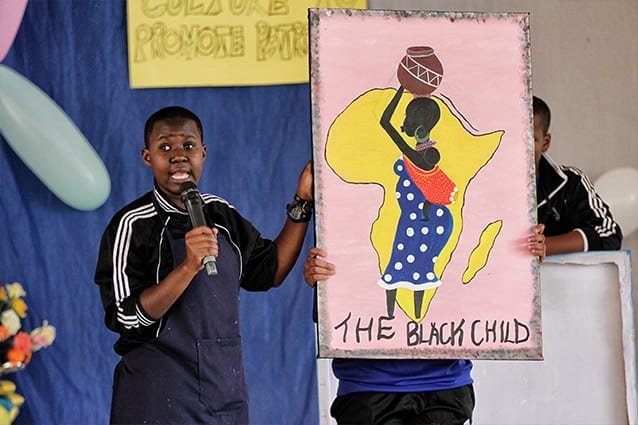
“This picture shows what it means to love your nation. This strong woman is a treasure to her nation, who is carrying her child. The child represents the future for Africa,” group members explained.
An indisputable highlight from the day was a surprise performance from secondary staff! Mr Humphrey even took to the stage for a dance, together with cooks and teachers from a range of faculties.
The day concluded with a vote of thanks from Deputy Director, Angela, who called upon students to sustain a positive culture within St Jude’s.
“Today has been a wonderful day to celebrate Tanzanian culture. As we know, there are many cultural areas within our lives, and school is one of those. Respect, responsibility, honesty and kindness are St Jude’s school values. Let’s all work together to make sure those values are always upheld.”
In October 2017, we introduced you to Jenifa, a then-Form 4 student who represented St Jude’s at the Women and Girls in Science workshop hosted by Nelson Mandela University.
Jenifa, the only daughter among three children, is destined to break the cycle of poverty for her family, having successfully attained an academic scholarship at St Jude’s to complete her A Level studies.
Immersed in many aspects of school life, Jenifa recently expressed her cultural pride, through participation in our annual Cultural Day festivities.
“Culture, to me, means a total way of life. I love being Tanzanian. From our food, to our clothes, our close families. Our way of being is very genuine,” Jenifa said.
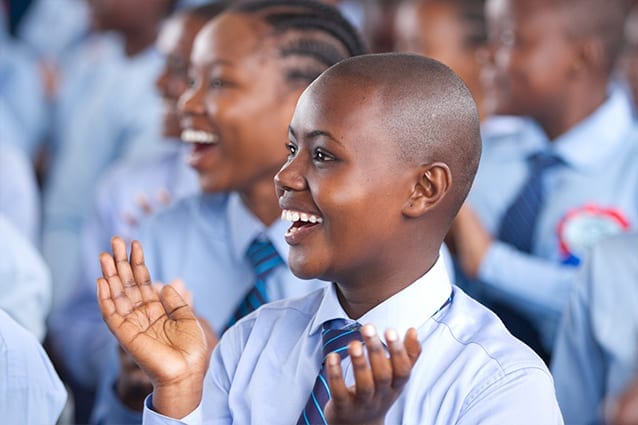
Jenifa belongs to the Meru tribe of Tanzania, who are renowned for their agricultural expertise and first arrived to Mount Meru in Arusha from coastal regions some 800 years ago.
“Being a member of the Meru tribe has influenced our family ways. The behavior, cooking, clothes and traditional dances we practice were passed down to us. It is important to carry them forward.”
Articulate and insightful, Jenifa explained that while it is important to ensure the sustainability of cultural traditions, she would like to play her part in advancing cultural status for women and girls.
“Last year I wanted to be an Aeronautical Engineer. I changed my decision and would like to be a doctor because I can help more women that way.”
“It is known that African culture does not always empower women. As a doctor, I can help women by treating them when they have babies. I will give them knowledge about hygiene, especially to young girls, and knowledge about maternity. I also want to support women’s mental health. If women go through trauma, they might have psychological problems, but as a doctor I can help to counsel them.”
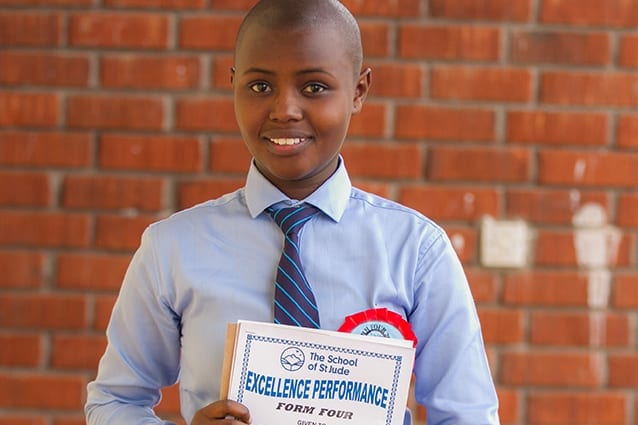
Jenifa believes St Jude’s Cultural Day empowers students to take pride in Tanzanian culture, and express creativity.
“Some are dancing, some are acting, some are designers, some are cooking. People can also cooperate and share ideas with each other.”
“I am in Form 5 and we have many new students joining us for A Level who would never have this chance at a government school. One of my friends, Nuru, is new this year and she participated in the fashion show. It makes me so happy to see how excited the new students are to attend this special day!”
Lotoishe is a young man who has already overcome significant barriers in his life, and who is now well on the way to a future of his own making.
He and his family live in a village named Mwandeti, around a two hour drive from Smith Secondary Campus, where he began his A-Level studies in July. “I heard about the school through my government school headmaster. On the day of my interview for St Jude’s, I started my journey at five o’clock in the morning. I had to walk for two hours to get to a bus station,” Lotoishe said.
“Two of us from my previous school did the interview at St Jude’s, and I was lucky enough to be selected. The day I was selected, I was so happy.”
Lotoishe, the eldest of five children, was a top-scoring student at his local government school and dreams of becoming an Engineer, and of improving life for his family.
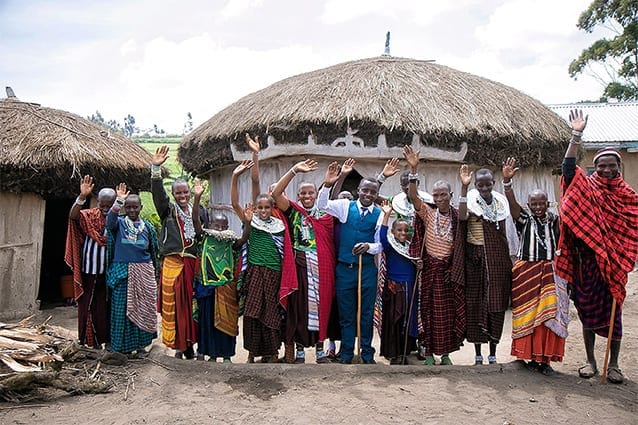
“When I got to St Jude’s I was surprised to find a lot of teachers. There are many good science teachers, but at my previous secondary school, there were barely any teachers.”
Usa River, where Smith Secondary Campus is located, may seem far from home for Lotoishe, but he’s now closer than ever to reaching his dream.
More than 15 relatives share small mud huts in Lotoishe’s boma — the traditional name for a Maasai dwelling — and their first-spoken language is Maa, the native tongue of the Maasai.
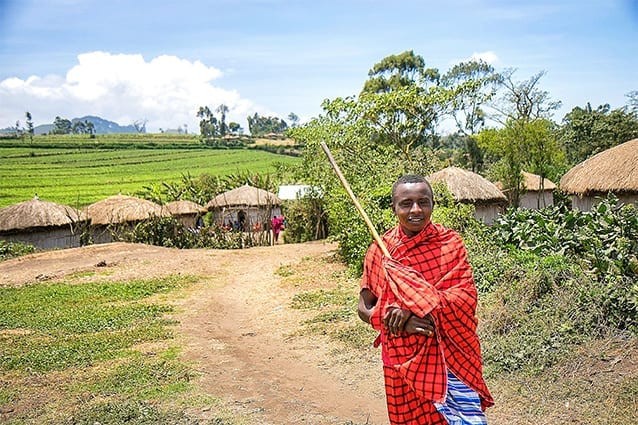
A narrow, unsealed road wedged into a large valley connects Lotoishe and his fellow Maasai community to urban Arusha. His mother, Nanare, walks for three hours uphill to fetch water at a communal tap.
“Our life is very difficult because we do not have enough money. I must walk very far to get to food and water, so my children eat food once a day,” Nanare explained.
“I spend every day doing chores for the family, fetching supplies, cleaning, looking after the young children. It is a hard life but I love my family.”
“Because we are Maasai, wealth is measured by how many animals we have. We only have two cows, we sold the rest to afford Lotoishe’s government school expenses.”
“I know my son will do well and he can make a good living one day. Education will help him get there and we know he can help us all to do better. We are so proud.” she said.
Lotoishe is one of 32 Form 5 students at St Jude’s whose academic scholarship is currently unsponsored. You can help to change his life, sign up to sponsor today!
*Quotes translated from Kiswahili and Maasai*
Ever wondered what it’s like behind the scenes at our Student Selection Days?
The opportunity to attend The School of St Jude is a highly competitive process. Scholarships are only offered to applicants who demonstrate academic excellence, and come from backgrounds of severe economic hardship.
The student selection process, led by our Community Relations team, and overseen by team manager, Charlotte, takes months of organisation and logistical planning.It involves over a hundred staff members, from guards, gardeners and bus drivers, to academic and administration teams, sacrificing Saturdays during selection periods to help on Student Selection Day and, in following weeks, poverty assessments inside hopeful students’ homes.
Student selection season for secondary students takes place between April and July, with primary students selected between August and October.
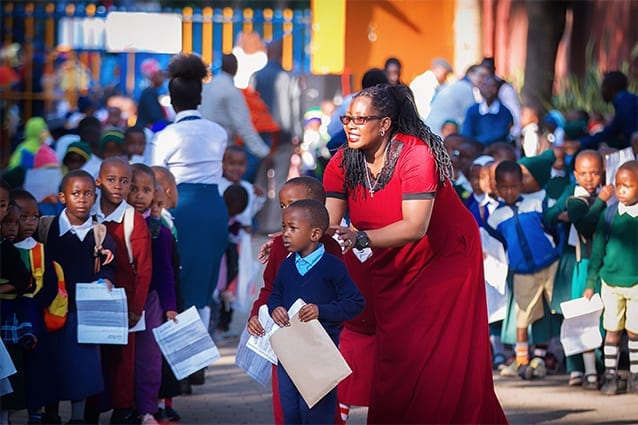
Standard 1 and 2 students, aged between 6 and 8, are our youngest recipients of a free, high quality education, and their selection process attracts the largest number of scholarship applicants.
Philomena has worked in St Jude’s Community Relations team since 2010 and has since played a vital role in selecting many of our students.
“Weeks before Student Selection Day, our team visits government schools within Arusha to deliver invitation letters to students who score in the top 10% of their government school Preparatory and Standard 1 classes. It is a huge activity.”
Academic testing begins at 8.30am on selection days and usually runs until 5pm. However, many students and their parents start lining up outside the Sisia Primary Campus gates from 6am.
For secondary scholarship applicants vying for positions in Form 1 (Grade 8) and Form 5 (Grade 11), the journey to Student Selection Day is much longer and more arduous… and not just in travel time!
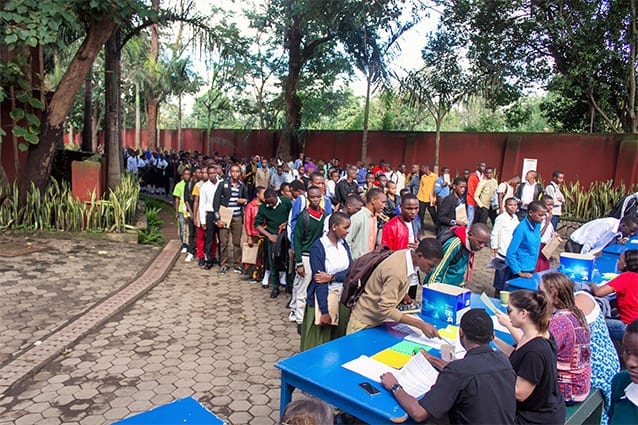
Form 1 applicants are invited from within the Arusha region, whereas Form 5 scholarships are offered to top-scoring secondary students from government schools in surrounding regions, as well as the Arusha region.
Successful Form 5 applicants will have received only a government school education for a decade, and many travel for more than a day via public transport to be at St Jude’s to sit their academic test.
Their resilience and potential for success is already proven; advancing from primary school to secondary school in Tanzania is uncommon. Additionally, with 4,614 O Level (Form 1-Form 4) schools, and only 540 A Level (Form 5-Form 6) schools in Tanzania, advancing from Form 4 to Form 5 is highly improbable for the majority of students.
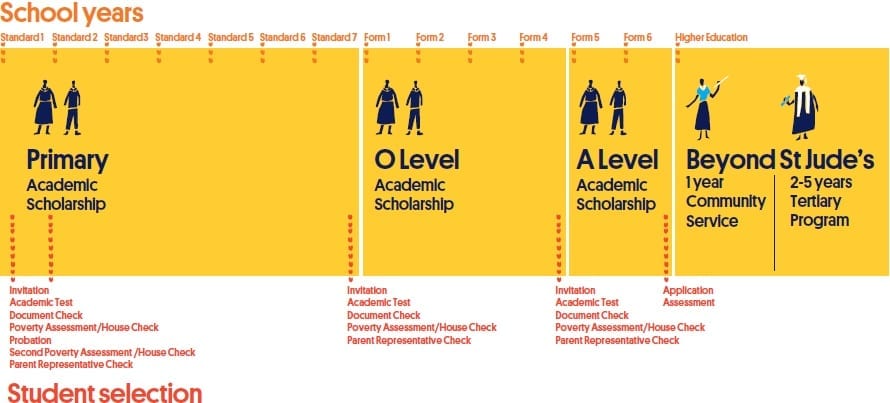
St Jude’s Form 1 and Form 5 scholarships provide a pathway for young, disadvantaged Tanzanians who have already demonstrated their academic skills, to progress beyond their means and their imagination.
Students who successfully pass St Jude’s challenging academic test and document checks on selection days are visited in their homes at a later date by poverty assessment teams, comprised of academic, business and facilities staff, as well as Parent Committee members.
It may take between 12 and 16 hours per day for poverty assessment teams to interview six Form 5 applicants, due to the long distances the teams have to travel.
Poverty assessments are always challenging, regardless of whether the applicants’ families are based locally or far away. Assessment teams encounter additional challenges, though, when travelling long distances to interview prospective Form 5 students in their homes.
Our bus fleet scales roads along the steep outskirts of Mount Kilimanjaro, traverses rocky terrain in remote tribal villages and, sometimes, get stuck in thick mud. Weather occasionally prevents our buses from reaching students’ homes on the first attempt, particularly during Form 5 student selection.
“In my first week at St Jude’s I found myself on a school bus, trundling around the Kilimanjaro region participating in Form 5 poverty assessments. The rain was so heavy that our bus struggled to drive uphill on long, muddy roads. We became bogged and eventually had no choice but to make our way back to a main road. Unfortunately we didn’t make it to that student’s house that day, which made me think how hard it must be for her to travel to school.” Supporter Relations Officer, Eithne, explained.
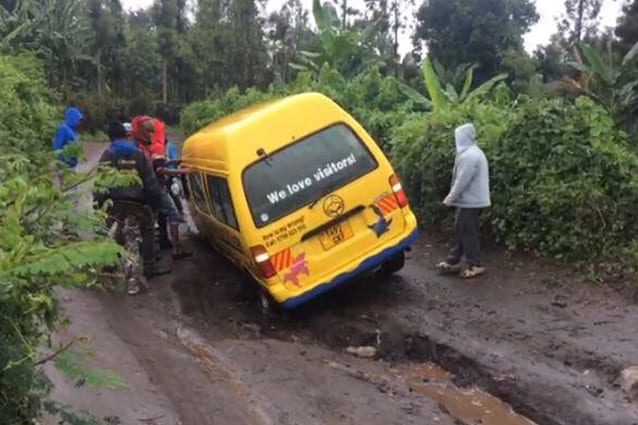
Travelling to remote areas enables us to expand the fight against poverty, and to reach some of the students in greatest need of an education.
Our Form 5 entrants consistently rank among top-scoring Form 6 graduates. Some of them, like Gift, have completed a Community Service Year and now study in leading universities in Tanzania or abroad, having attained scholarships through Beyond St Jude’s and the MasterCard Foundation Scholars Program at African Leadership Academy.
A bright future is just a few short years away for students who join St Jude’s in Form 5. Consider giving them a step up and sponsor an academic scholarship for one of these remarkable young adults!
We spoke to the students involved in one of our most successful fundraising campaigns. Read about the impact it had on them.
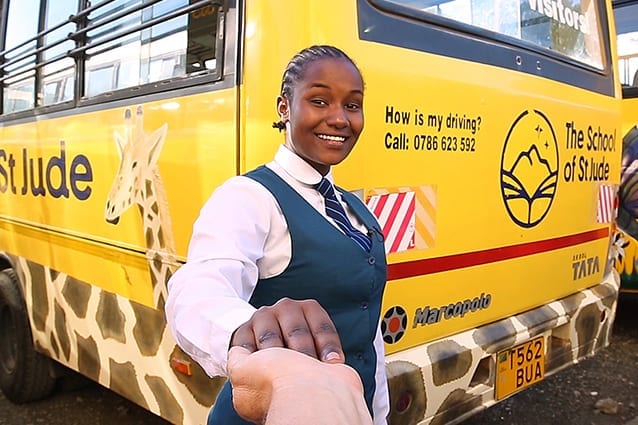
Student 1: Lina
Grade: Form 6
Career Ambition: Human Rights Leader
1. What would you like to say to the Appeal donors?
Lina: Thank you! They should keep up with the same spirit. One thing they should keep in mind is that they are investing in us and in the future they will see how the students they support will change the world. St Jude’s isn’t a small thing. It’s unique and the time will come when they will see real doctors, lawyers, scientists and others who can help our country.
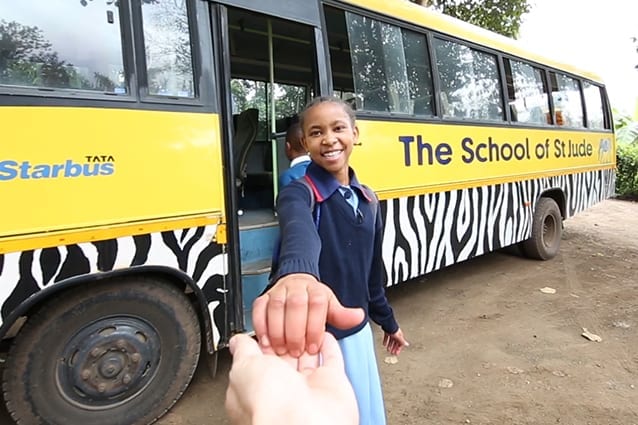
Student 2: Theresia
Grade: Standard 6
Career Ambition: Teacher
2. How did it feel to be on camera?
Theresia: I felt grateful because I knew that I was doing it in order for us to get more supporters for all St Jude’s students. I felt good and trust myself that I can talk in front of people without regarding who the message reaches.
3. How do you feel when you know many people want to support your school?
Theresia: I am excited because there are many more Tanzanian children who need help.
Lina: I feel very good since I know that many students who come from poor economic conditions are going to be supported. Many dreams are going to be achieved and most of all, the school is going to get more graduates who will help the school in the future. I also feel many people trust and believe in us. It encourages me to study harder so I cannot let down people who trust and believe in my abilities.
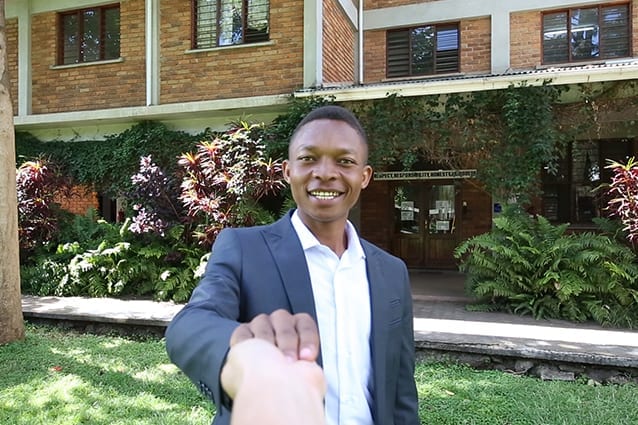
Student 3: Amani
Graduating Class: 2016
Career Ambition: Medicine
Amani graduated with the Class of 2016. A key protagonist in our alumni program, he is a driven leader who leaves a positive impression on everyone he encounters.
It is little wonder he was our Marketing team’s first choice to be one of the faces of the ‘helping hand’ campaign video. His success as a St Jude’s graduate is a heartwarming tale of fighting poverty through education.
In 2005, Amani was selected for a St Jude’s primary scholarship — he was 10 years old. Little did he know how much he would accomplish in the next 13 years!
Amani is now a university student at Africa University in Zimbabwe. He received a scholarship through St Jude’s partnership with the MasterCard Foundation and African Leadership Academy.
“I could never have dreamed of going to university before I came to St Jude’s. I was just focused on getting to secondary school. Then I realised on the day of Form 6 Graduation that my dream was coming true,” Amani said.
Theresia, Lina and Amani, as the faces of our campaign, symbolise the success of St Jude’s. We can expect great things from these young people in years to come!
I came to St Jude’s for my first enrolment test 12 years ago, and I remember it as though it were yesterday. The year was 2006. I dreamt of wearing the beautiful navy blue school uniform and visualised the excitement of stepping onto a St Jude’s school bus.
At student selection testing, we were instructed to read a story about two people named Peter and Jane. I recall nervously sharpening my pencil for a writing and mathematics test. I was determined to succeed. I remember exiting the school gates with one hand holding a letter of my acceptance and the other waving in the air as I cheered, while scanning the crowd outside for my mother, who was overjoyed. I knew I had to strive for success to maintain my academic scholarship.
Walking for the first time through St Jude’s school gates as one of the students, I knew from that point my life had changed. The school buildings stood as tall as my dreams.
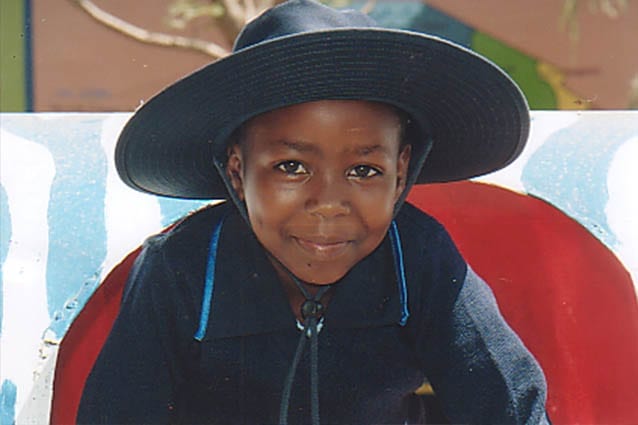
At St Jude’s, I completed five years of primary school instead of seven because of my good academic performance. My teachers had enough faith in my abilities that they promoted me from Standard 2 to Standard 3 in 2007, and in 2009, I was promoted from Standard 5 to Standard 6. I graduated from primary school in 2010, much earlier than my fellow students that I was enrolled in with. This process validated my abilities and helped me to become resilient.
An unforgettable experience was when I had to write a letter to my sponsor to introduce myself. I was so young, not so fluent in English, but I wrote from the heart as well as possible. I explained my love for biology and my aspiration of putting a smile on people’s face as a medical professional one day. I added to my text with a drawing of a bicycle.
I couldn’t believe it when my sponsor wrote back! I was so excited to learn he was a doctor too. He was a unique inspiration for me to fight poverty through education. He nourished my dreams and motivated me by giving me the chance to receive a free, high quality formal schooling.
I passed Standard 7 and continued into secondary school at St Jude’s in 2011. School became tougher that year, and so did I.
I spent my free time reading novels and drawing cartoons. Reading improved my writing, speaking and conversational skills. We had access to so many resources that government school students do not have.
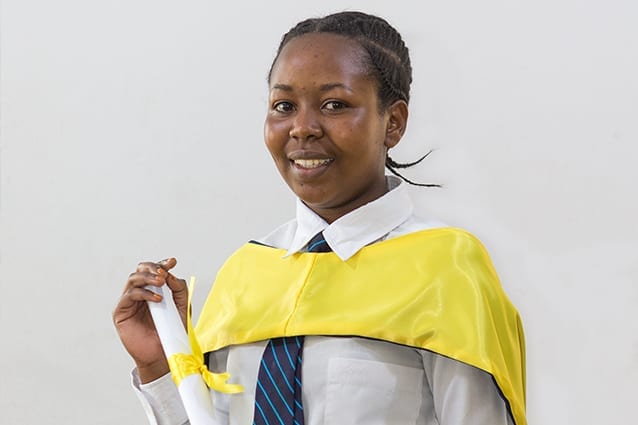
It was in 2017, the year I graduated from St Jude’s, when I developed a keen interest in joining the Beyond St Jude’s program as a way to give back through the Community Service Year.
I was lucky enough to be accepted, and after completing three months of national service, a mandatory requirement for some Form 6 graduates in Tanzania, I commenced my Community Service Year as an interning chemistry teacher in an underprivileged government school.
I had two goals; creating self-awareness among the students and doing my best to help them succeed academically.
Halfway through my government school internship, I decided to try professional development of a different kind and joined St Jude’s Marketing team as an intern. This gave me a glimpse of the broader St Jude’s community. I know so much more about the efforts people make to financially support St Jude’s, and I also know more about how we influence change through education.
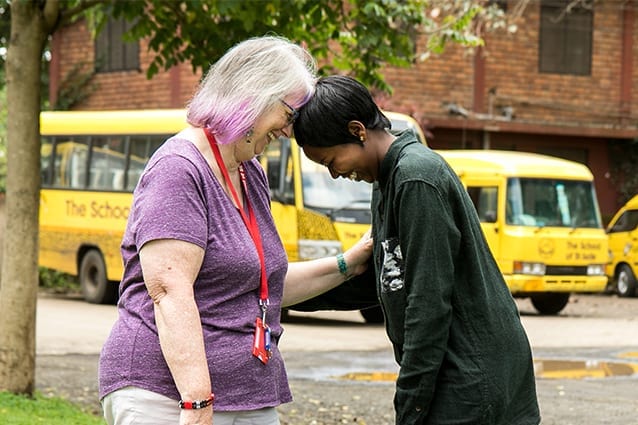
During this time, the Beyond St Jude’s staff empowered me every day. I applied for a number of scholarships and was accepted into the Mastercard Foundation-African Leadership Academy Scholars program. This month, I will commence my studies at the American University of Beirut in Radiology, fulfilling my dream of making a difference to people’s lives as a health professional.
St Jude’s has given me an invaluable reward: my education, for which I am forever grateful. This school is more than a school. It is a family that I am proud to be a member of.
Would you like to support a member of the St Jude’s family? Sponsor a young leader today!